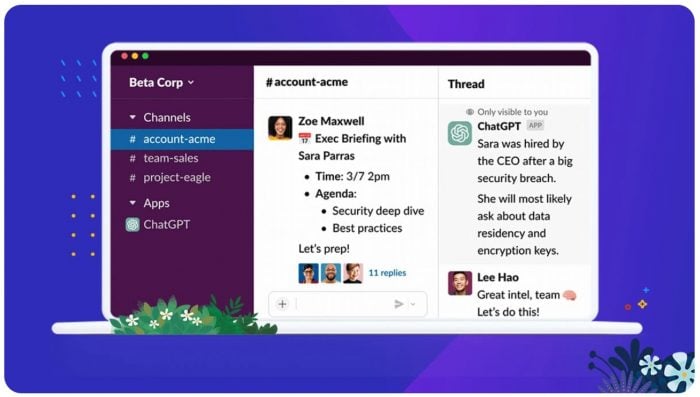According to a research report conducted by Slack (now owned by Salesforce); regarding new Generative artificial intelligence like ChatGPT - more than half of senior IT leaders say they are "either experimenting with or actively using generative AI in their business." That amounts to 67 percent of those deemed "senior" IT pros.
And more than 57% of senior IT say they think generative AI is a ‘game changer’ - with the technology possessing the power to help them "better serve customers." There are, of course, other implications, like the fact that they believe generative AI like ChatGPT will help them "take advantage of data; and operate more efficiently."
Even if you are like me and keep hearing about it - yet remain skeptical; those folks can still admit there is something to the seemingly "over-hyped" phenomenon of generative AI. Thirty-seven percent of respondents believe as much.
Slack further found that 80 percent of said skeptics agree (with the notion) that generative AI can assist in better-serving customers. Next, I would like to answer a fundamental question. Namely: What exactly is ChatGPT? Essentially: it is an artificial intelligence tool developed by OpenAI that learns and improves over time.
It can answer questions, write copy, train, and even act as a virtual assistant: to name a few of the technology's budding roles. It can also paint write/perform music and even assist in resolving customer service queries. There do, however, remain some ethical concerns regarding the bleeding-edge technology.
According to that same Slack report, some share concerns that the technology brings the probability for security risks, a mammoth 79% of senior IT. And they also believe that bias 73% plays a title role in the AI's (conceivable) flaws.
I will explore what Slack has done to its UCC offering by enabling ChatGPT functionality within it - the importance for both users and customers and what exactly ChatGPT is - as it has gained much fanfare as of late.
Slack Realizes Perks of ChatGPT in UC, CX
Already UCC firms like Microsoft and Five9 have some (sort of) integration with ChatGPT - recognizing the inherent benefits of integrating the technology into their stacks for CX enhancement. And that is just how lightening fast we are moving in the UC space - integrating technologies as soon as they penetrate the market.
Slack/Salesforce is no exception. Now, Slack users can access the ChatGPT app for Slack: which delivers instant conversation summaries, research tools, and writing assistance from the unified communications app.
The app, presently in beta, assists users in getting up to speed on channels and threads, extending AI-powered conversation summaries - letting them efficiently and quickly catch up on the latest. Regarding CX, users (which could be) contact center agents can instantly find answers on any project or topic, leveraging the feature's AI-powered research tools. According to a statement by Slack:
"Via said tools, users can learn and build expertise faster right from Slack — whether they’re researching best practices, prospecting a new account, and more."
On the productivity front - Slack users, which again (could) include customer service agents, can draft messages a lot faster to team members and customers - thanks to fresh AI-powered writing assistance tools. That could spell out reducing the time it takes to craft replies, write status updates, and meeting notes. Slack's app for ChatGPT will join the firm's more than 2,600 other integrations.
On the factor of privacy - Slack wrote:
"Any data our app gains permission to access; will not get used for training ChatGPT’s language model."
Slack says its team "has been piloting the app to engage with their customers directly across sales, service, and engineering teams." And its integration with ChatGPT is a part of Slack Connect and Huddles, platforms primarily leveraged for customer communications.
Stressing the Gravity of Chatbots in UCC
As many companies in the space have more than double-down on their AI efforts in recent months: it (more than) underscores the importance of said experiences. Yet, Tim Porter, Senior Director of Product Management at Dialpad, talks about the impact of ChatGPT on the contact center space, noting that we should still proceed with caution, writing in a company blog post:
"And while there’s a vast number of ways in which they can use AI, very few businesses can provide transparency or control over the data that AI is using and/or producing. Many product owners lament; How AI is a “black box” and how businesses need to ensure the knowledge output to customers is controllable."
Presently: Porter adds, ChatGPT suffers from what he calls "an extreme version of this." He continues, stating; the technology is not infallible and can still make mistakes - but it can also make incorrect claims that sound "convincingly true."
Five9, seemingly on the cusp of actualizing its ambitions in AI: recently established a suite of tools leveraging ChatGPT technology that includes real-time transcription that automatically transcribes customer conversations and places them into categories and an AI summaries feature.
These are a few ways firms across the globe and in the UCC/contact center space have begun to leverage said technology to fit the needs of customers and their solutions. Creativity will continue to prove challenging during a time when customers demand more than ever before.
The Promise of a "Better Experience"
And companies will continue to cling to that - hoping their latest AI innovations will be sufficient to woo customers with the promise of a better experience.
Since Salesforce purchased Slack, it has more than expressed its interest in beefing up its AI efforts. Just last month, it released a slew of AI-fueled features that use its Einstein AI to detect outages, create common workflows, and WhatsApp to engage customers via enriched video, audio, etc.
As for ChatGPT, it will be intriguing to see how various efforts unfold and how UCC/CC companies continue to integrate GPT technology into their stacks (to hopefully) improve 'various' experiences across the board. It will be no small chore: but one that seems (very much so) worthwhile for those taking the time to build said integrations
For now, at least, it seems that anybody who is anybody will have some mention of ChatGPT in their offering - the most significant factor, is: What kind of value to users and customers?



